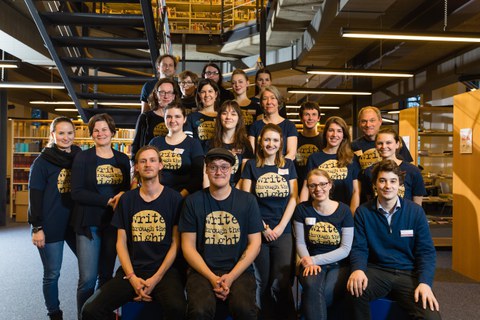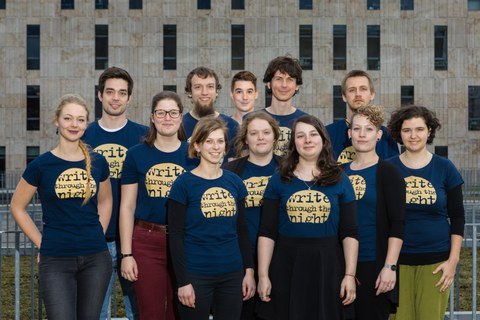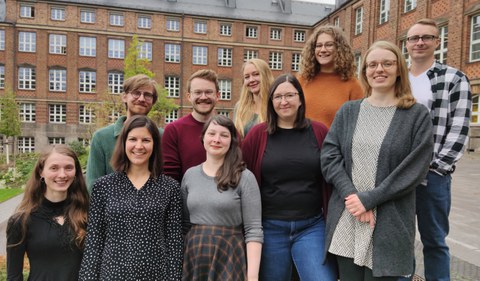Uni start

The Writing Center team for the Long Night of Writing in early March 2020.
Welcome to your studies at the TU Dresden! In order to make your studies a success, the team of the Writing Center of the TU Dresden is at your disposal for advice and information throughout your studies - no matter which subject or combination of subjects you are studying.
On this page, we present you with initial information and introductory events on scientific writing and working:
Table of contents
Never heard of a writing center at a university or, "other than writing there," can't really imagine how a writing center can support you? Then watch this short video:
Accessibility Note: detailed video description to read and have read aloud at https://tud.link/25u4
If you would like to take a further look at how the TU Dresden Writing Center can help you with your academic writing and work, check out our web area for students at tud.de/deinstudienerfolg/szd/fuer-studierende.
Learning to write scientifically - step by step
You have certainly written a lot, at school, perhaps in your training or your job, but scientific texts probably less. But don't worry: writing is a tool and can be learned - and even "learned by doing", i.e. while you are writing. In a humanities program, you'll do an average of one to three writing assignments each semester, and you'll definitely write a thesis. And even in math and science courses, you'll write a variety of academic texts before you write your thesis, such as document papers, technical reports, and project papers.
We support you in acquiring the skills you need to write your scientific papers and have briefly summarized the "what" and "how" of scientific writing in the following video:
Accessibility Note: detailed video description to read and have read aloud at https://tud.link/25u4
During your studies, you will become better acquainted with scientific writing and work semester after semester and develop your skills in the process. Just as in art and craft, no master has ever fallen from the sky. And to take another look at the proverbial box: "Many roads lead to Rome" - or to scientific writing and work.
Even if, for example, you have already written a technical paper in school and had no problems with it, your scientific writing style will certainly change in the course of your studies. You will get to know different ways to go your way in science and to find your writing and working style. If you are looking for support, you can always contact the team of the Writing Center of the TU Dresden. We offer you support e.g. in workshops, with different materials in our Infothek on OPAL and with a personal writing consultation. (Technical note: In order to open the links in a new window or tab, please open them by right-clicking with your mouse and selecting "Open link in new tab/window").
What type of writer are you?
Writing type tests can help you find out
Many school texts, especially in exam situations, are often written ad hoc, i.e. "out of the moment", with little revision. In studies it is different: A scientific text usually needs several revision phases. You can find out what these are in the FAQ on this page.
Even if there is a typical work process for academic writing, there are different types and strategies for writing and developing text content. One possible typology speaks of "structure-following" and "structure-creating":
- Some do thorough research in advance, think carefully about what they want to write before the first sentences and then revise the content less. This type is called "structure-following" because a text structure is developed first before the text itself is created.
- Others write at random, then do more in-depth research and revise their content thoroughly on the draft text. This type is called "structure-creating" because, roughly speaking, the structure of the text is created during the writing process.
Both are perfectly fine, because both paths lead to the goal. If you want to find out which type you are more like, think briefly about the last text you wrote and answer the questions in the following quizzes with this in mind:
Note: To open the respective test in a new window, please open it by right-clicking with the mouse and selecting "Open link in new tab/window".
- Self-test: Writing type test "Creating structure or following?" (in German, short, online via ONYX without registration)
- Self-test: Writing type test "Creating or following structure?" (long, PDF)
At the end of each test, you will receive a score and can use this to assess which writing type you tend to be and what this means for you. It is important to note that a person rarely corresponds to exactly one type and you can try out the different types and their writing styles in the course of your writing work and studies to find out how you work best.
There are different approaches to dealing with your writing strategies and assigning yourself to different types. Another typology distinguishes between gold digger, squirrel, adventurer and decathlete - you can find out which type you tend to be in the test.
Note: To open the test in a new window, please open it by right-clicking with the mouse and selecting "Open link in new tab/window". This test only works in Internet Explorer.
At the end of each test, you will receive a score and can use it to assess which writing type you tend to be and what this means for you. It is important to note that a person rarely corresponds to exactly one type and you can try out the different types and their writing styles in the course of your writing work and studies to find out how you work best.
Our colleagues from the Writing Center Frankfurt am Main explain the different writing types "gold digger, squirrel, adventurer and decathlete" in this video on YouTube:

Das Team der Schreibtutoren/innen zur Langen Nacht des Schreibens 2018.
If you have questions about a test, the types of writing, or any other topic related to academic writing and papers, feel free to contact us at any time either for a one-on-one writing consultation with the Writing Center's writing peer tutors (online or in face-to-face meetings, see the Writing Consultation website for more information).
FAQ - typical questions and first answers
As already mentioned: Scientific writing and work can be learned, and your studies are also designed for this purpose. You can find an overview of the various methods you can use to develop and write your scientific texts in the Start Help Writing (PDF, not yet accessible). (Technical note: To open the PDF in a new window or tab, please open it by right-clicking with your mouse and selecting "Open link in new tab/window").
Answers to questions that many students have at the beginning of their studies can be found in this FAQ:
The writing process on a scientific writing project is very complex, due in part to the variety of tasks that must be accomplished. The actual writing is only part of it. Researching and reading are just as much a part of it as planning beforehand and revising at the end. You can find an overview of the phases of scientific work and writing in our handout on the overview of work phases with the "Writing Dragon".
It is up to you to decide how you want to organize these individual steps. Some work through one phase after the other in a structured way, while others jump back and forth in a ping-pong style, for example because new research has resulted from reading. The important thing is to be aware of each of these steps or phases and schedule time for them accordingly. Not sure yet what type of writer you are? The writing type test can help you with this question.
Literature tips
Esselborn-Krumbiegel, Helga: Von der Idee zum Text. Eine Anleitung zum wissenschaftlichen Schreiben, Paderborn 2008. S. 16 – 23. (Kapitel: Phasen der Textproduktion)
For the daily writing time there is the recommendation: No more than four hours, because normally the effectiveness decreases strongly after that. However, such guidelines underestimate the fact that performance varies from person to person. It is much more important to reflect on one's own way of working than to stick to a given time. Questions that should be addressed in any case are:
- Do I work better in the morning or in the evening?
- What does my personal performance curve look like? (Tip: For most people, the low point is sometime between 12 and 4 p.m.
- At what time of the day do I have the least or no disruptions?
A very decisive and fundamental question that tends to fall by the wayside is: When do I write and when do I not? This already hints at something that is also very important: scheduling breaks! Working according to the Pomodoro technique helps you to take regular breaks. In this handout from our Infothek, we show you how the Pomodoro technique works.
Literature tips
Esselborn-Krumbiegel, Helga: Von der Idee zum Text. Eine Anleitung zum wissenschaftlichen Schreiben, Paderborn 2008. S. 24 – 29. (Kapitel: Die Zeitschiene)
Rost, Friedrich: Lern- und Arbeitstechniken für das Studium, Wiesbaden 2004. S. 101 – 113. (Kapitel: (Zeit-)Planung und effizientes Arbeiten)
First of all: Yes, there is. Many scientific texts may give the impression that their information content is packed into a strict linguistic corset, so that there is no place for a linguistic style of one's own in science. However, the linguistic norms are not that strict. This is simply due to the different ways of working in different disciplines and cultural circles. It is important to realize that as an author you are entering into a dialogue with the research community. The text is therefore intended to convey knowledge to others, which creates a communication process. This follows some principles, namely that of exactness, unambiguity, and neutrality or objectivity. If you adhere to these principles, which provide the framework, you can give your own text your own touch and develop your own personal scientific style. Be sure to discuss this with your lecturer.
Literature tips
Auer, Peter und Baßler, Hager (Hrsg.): Reden und schreiben in der Wissenschaft, Frankfurt am Main 2007. S. 9 – 29. (Kapitel: Der Stil der Wissenschaft)
Esselborn-Krumbiegel, Helga: Richtig wissenschaftlich schreiben, Paderborn 2010. S. 11 – 22 . (Kapitel: Grundlagen wissenschaftlicher Sprache)
A good research question summarizes the goal of a scientific paper in a concise and comprehensible way. In it, the author formulates his or her interest in knowledge and delimits the topic under discussion. In this way, it offers both the reader and the writer a tangible point of orientation and guides the reader through the usually very extensive subject matter with which the paper deals.
One method that can help you develop a good research question is the three-step approach.
An essential principle of scientific work is that of comprehensibility. Foreign thoughts are desired and also necessary for one's own argumentation. However, they must also be marked as such and thus clearly distinguishable from one's own. Text passages that are not marked as a quotation are attributed to oneself. If you take over the thoughts of other authors without making this clear, you are claiming other people's property as your own and thus committing intellectual theft.
further information (in German):
Göttert, Karl-Heinz: Kleine Schreibschule für Studierende, München 2002. S. 35 – 39. (Kapitel: Zitate und Fußnoten)
Überblick über gängige Begriffe und Abkürzungen auf dem Citavi-Blog
Link zu YouTube: Warum zitieren wir? Ein Erklärfilm des Bibliothekertags 2017.
Auer, Peter und Baßler, Hager (Hrsg.): Reden und schreiben in der Wissenschaft, Frankfurt am Main 2007.
Esselborn-Krumbiegel, Helga: Von der Idee zum Text. Eine Anleitung zum wissenschaftlichen Schreiben, Paderborn 2008.
Esselborn-Krumbiegel, Helga: Richtig wissenschaftlich schreiben, Paderborn 2010.
Göttert, Karl-Heinz: Kleine Schreibschule für Studierende, München 2002.
Rost, Friedrich: Lern- und Arbeitstechniken für das Studium, Wiesbaden 2004.
Online workshops to try
The writing peer tutors of the Writing Center offer various workshops that can be very helpful for students in their first semester. You can find the current workshop program on our website for students under "Workshops".
Some workshops, short tutorials, and podcasts are also available on the Writing Center's YouTube channel:
- Podcasts LateBirds: Christina, Kiron, and the occasional guest share methods and writing tips that help them in their studies. (in German)
- Playliste Praxistipps aus der Schreibberatung: Writing Peer Tutor Andrej has compiled tips on topics that always come up in writing consultations: writing habits, time management, and revising. (in German)
- Breaks are important: short 5-minute yoga breaks tutor and yoga teacher Isabelle has recorded for you.
For even more Writing Center tips, videos, and podcasts, visit our Infothek on OPAL and subscribe to our bi-monthly newsletter with tips and current offerings from the Writing Center.
 © TUD
© TUD
Writing Center of TUD
Send encrypted email via the SecureMail portal (for TUD external users only).
Visiting address:
Fritz-Foerster-Bau, room 571 Mommsenstr. 6
01069 Dresden
Postal address:
TUD Dresden University of Technology
Zentrum für Weiterbildung/Career Service
Schreibzentrum
01062 Dresden
The Writing Center of the TU Dresden (SZD) is the central point of contact for everything related to academic writing and reading. The SZD supports students and lecturers, among other things, with offers for planning and writing various texts in studies such as vouchers, protocols, seminar papers and theses and for teaching academic writing in teaching and supervision.
All information about further offers and possibilities of support, also especially for the online semester, can be found on the website of the Writing Center.
Do you have any questions?
Just send us a quick email to .

The Writing Centre team during a team meeting in January 2021.
Translated with www.DeepL.com/Translator (free version)




